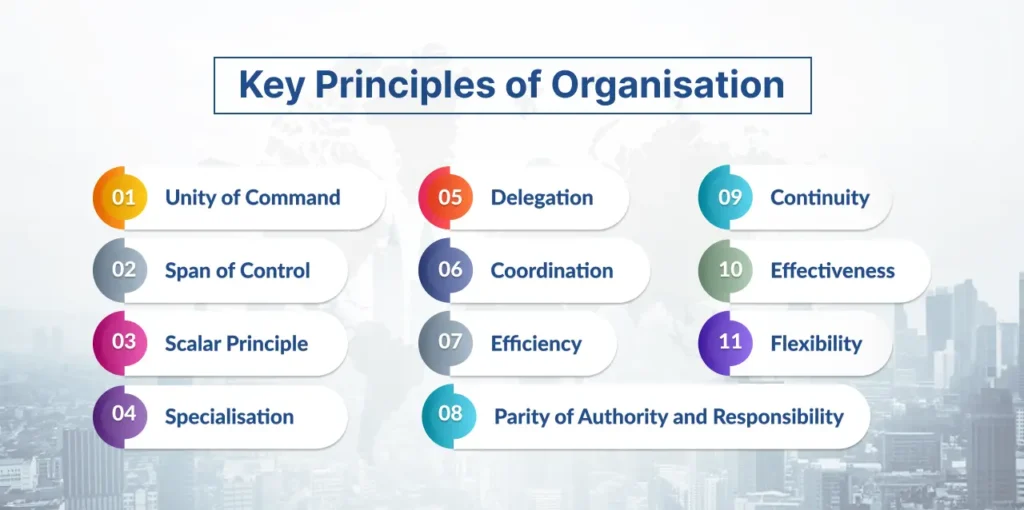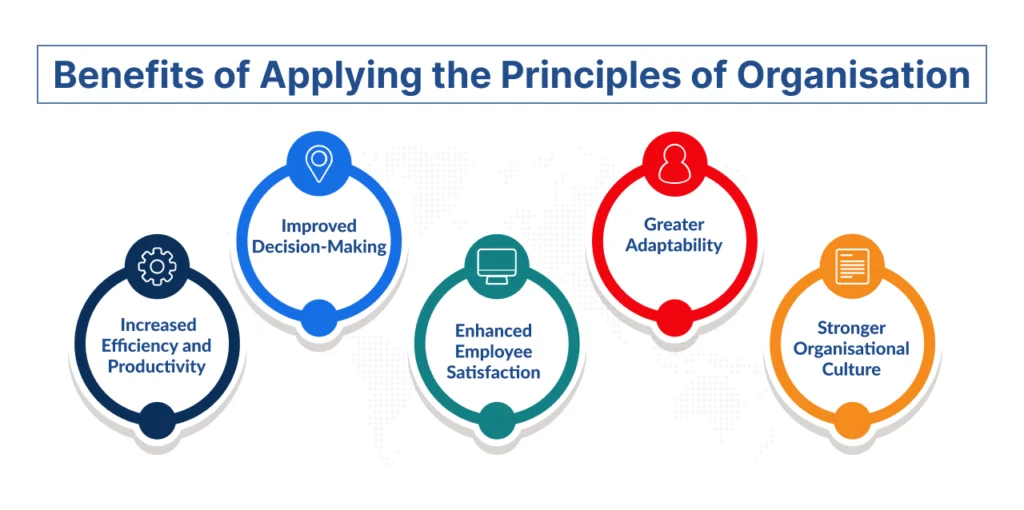Understanding the Principles of Organisation: Benefits and Importance
Think of a team building a giant sandcastle at the beach. Everyone has a specific role, from digging the moat to sculpting the towers. To make something unique, they need to work together clearly and organizationally. That’s precisely what the principles of organisation do for any group or project, big or small. They’re like the instructions for building a successful sandcastle, helping everyone work together smoothly and efficiently to achieve their goals.
Understanding the Principles of Organisation
|
Definition |
Principles guiding structured and efficient organisational operations. |
|
Importance |
Foundation for efficiency, clarity, and adaptability in organisations. |
|
Benefits |
Efficiency, better decisions, employee satisfaction, adaptability and culture |
The principles of organisation are the general rules we encounter in our daily lives, and they dictate the lives and dining of any organisation. They specify who does what, where, and when in a system and how responsibilities are subdivided and communicated.
These principles allow organisations to accomplish specific goals, policies and objectives without creating disharmony.
Key Principles of Organisation

Given below are the top key principles:
1. Unity of Command: This principle emphasises that each individual should have only one direct supervisor. This ensures clear lines of authority, prevents confusion, and avoids conflicting instructions.
For example, a sales representative should only report directly to their sales manager, not the marketing manager or the CEO.For instance, a sales representative should be required to report to their sales manager only and not the marketing manager or the CEO, among others.
2. The Span of Control: This principle refers to the number of subordinates a manager can effectively supervise. Having too many subordinates can overwhelm a manager, leading to decreased efficiency and communication breakdowns.
The ideal span of control depends on various factors like the complexity of the tasks, the manager’s experience, and the available resources.
3. Scalar Principle: This principle outlines a definite line of authorship, clearly showing how a certain level of management supervises the lower level of management or personnel and is responsible to the next higher level.
This establishes the flow of authority and promotes responsibilities and accountability among personnel. For instance, we can have Chief Executive Officers, Vice Presidents, Directors, Managers, or even employees performing at an organisational level lower than the managerial level.
4. Specialisation: This principle advocates for dividing work into specialised tasks based on individual skills and expertise. They can allocate their time and energy to their strengths, making the work more effective and productive.
For instance, a company’s marketing division may have subspecialties such as content creation, social media marketing, and data analysis.
5. Parity of Authority and Responsibility: This principle states that authority should be commensurate with responsibility. Individuals should have the necessary power and resources to fulfil their assigned tasks effectively. For example, a project manager should have the authority to make decisions about resource allocation and budget within their project scope.
6. Delegation: This principle involves entrusting subordinates with authority and responsibility for specific tasks. This empowers individuals, promotes ownership, and frees up managers to focus on strategic planning and oversight.
For example, a manager might delegate the task of writing a report to a team member while still providing guidance and support.
7. Coordination: This principle emphasises the importance of aligning the efforts of different departments and individuals towards achieving common goals. Effective communication and collaboration are crucial for successful coordination. Regular meetings, cross-functional teams, and clear communication channels can facilitate coordination.
8. Efficiency: This principle aims to work hard to produce as much as needed, which will entail using as little input as possible. Organisation is crucial in introducing concepts that help remove forms of waste in an undertaking.
For instance, applying technology in a particular working environment to eliminate routine duties and instituting standardised procedures that do not entail a lot of paperwork could enhance efficiency.
9. Effectiveness: This principle’s aim is the intended outcome. In essence, the organisational principles support effectiveness by ensuring that organisational successes and resources fit the broader organisational goals and objectives.
Direction in function, feedback, and correction translate to superior efficiency as far as goals are concerned.
10. Flexibility: This principle recognises that circumstances in the environment also change, and organisations need to fit in with the new environment.
The principles must be implemented in a manner that allows them to be modified or altered with relative ease.
11. Continuity: This principle underlines the necessity of constant work and organisational dynamics to run an enterprise or business effectively.
This includes preparing for the continuity of the management team, passing on managerial expertise and leadership, and being prepared for worst-case scenarios.
Benefits of Applying the Principles of Organisation

By adhering to the principles, individuals and organisations can reap a multitude of benefits, including:
1. Increased efficiency and productivity: Organised structure, role definition, and communication make the job easier, more productive, and more efficient as the resources and time are optimised.
2. Improved decision-making: Effective communication and responsibility reporting enable well-informed and well-timed decisions from hierarchical management.
3. Enhanced employee satisfaction: Employees remain motivated by tackling an organised environment with goals and chances for self-improvement which is concise and equitable for everyone.
4. Greater adaptability: These features help organisations adjust to environmental fluctuations and deliver performance that is compliant with market requirements.
5. Stronger organisational culture: Implies that when the principles of organisation are well followed, it leads to the enhancement of performance, coordination, and constant evaluation and improvement.
The Importance of Principles of Organisation
The principles are not abstractions that are just nice to think about; they are the premier asset of any enterprise. Their importance lies in their ability to: Their importance lies in their ability to:
1. Provide Structure and Clarity:
Internal organisation machinery acts as a framework that provides a fixed business form in an organisation. In facilitated processes, this leadership structure increases accountability, prescribed responsibilities, and specifies how work is done.
This helps reduce confusion and duplication and also brings everyone on the same page regarding a particular project.
2. Enhance Efficiency and Effectiveness:
A structured and fair environment with clear expectations and opportunities for growth fosters a sense of purpose and satisfaction among employees.
These constitute key pillars of organisation that greatly enhance efficiency and effectiveness. By doing this, organisations can attain the goals and objectives set apart from achieving more with less investment.
3. Stronger Organisational culture:
Consistent application of the principles of organisation fosters a culture of collaboration, accountability, and continuous improvement.
4. Motivate and Empower Individuals:
This is because when people understand why they do what they do, where they are going, the part they are supposed to play, also they take ownership of their work.
This also enhances motivation and commitment in most cases since people want to be associated with the organisation’s success.
5. Promote Adaptability and Change:
The principles of organisation provide a framework that is flexible and adaptable. This allows organisations to respond effectively to changing circumstances, market demands, and unforeseen challenges. By embracing continuous improvement and adjusting structures and processes as needed, organisations can ensure their long-term sustainability.
Conclusion
It is important to note that the principles of organisation are not mere policies; they are the basic tenets that can lead people, groups, and organisations to success. With these principles in mind and following their guidance in practice, establishing more structure and clarity, organisation enhances outcomes and makes the path to goals more meaningful.
Principles of Organisation : FAQs
Q1. What are the principles of organisation?
The fundamental guidelines and values that shape the organisation’s culture and decision-making processes are called organisation principles.Fundamental guidelines that shape how an entity structures and operates.
Q2. Why are principles of organisation important?
They bring order, productivity, work outputs, and accomplishments in delivering tasks and missions, amongst other benefits.
Q3. What is this principle of “unity of command”?
Principle of unity of command refers to every employee directly reports to a single manager and receives managerial oversight from him or her.
Q4. What's the "span of control" principle?
The principle of the span of control refers to the capacity to manage and control the number of employees in the delegation.
Q5. What's the "specialisation" principle?
The principle of specialisation refers to a strategy where the work is divided into specific sections with people assigned to each area of their expertise.
Our Programs
Recent Blogs



- Amity University Online MBA
- Shoolini University Online MBA
- Sharda University Online MBA
- Uttaranchal University Online MBA
- Symbiosis Online MBA
- Jain University Online MBA
- Manipal Online MBA
- OP Jindal University Online MBA
- LPU Online MBA
- NMIMS Online MBA
- DY Patil Online MBA
- UPES University Online MBA
- IIM Kozhikode Online MBA
- MICA
Online MBA Specialisations
- Amity Online MCA
Online MCA Specializations
Copyright ©2025 All Rights Reserved by Hike Education Pvt. Ltd.











.png)

.png)




